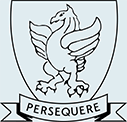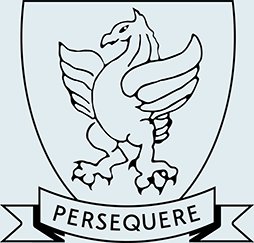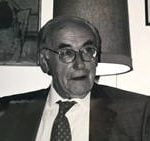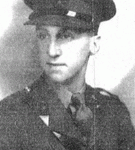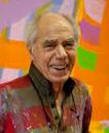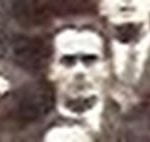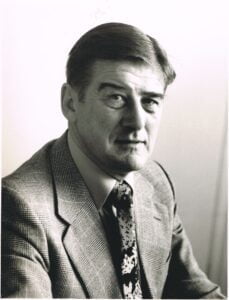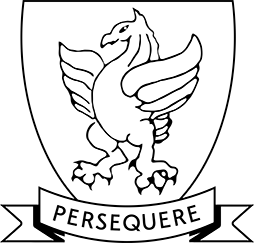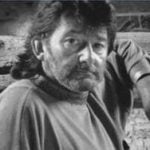
Clyde Holmes was born in London. His father was a Londoner who worked for the Royal Mail and his mother, who was Polish, worked in a factory. Clyde attended Holloway County School and spent two years working as a session musician for various bands before going to study fine art at Hornsey College of Art and St Martin’s School of Art from 1965 to 1968. He then got a job at the British Library working with blind people until he made the decision to leave London in search of a more rural life.
In 1970, Clyde searched for a place in north Wales that would feed his imagination and inspire his work. He found a remote Snowdonia farmhouse that had been abandoned in 1947, when the house was covered in snow and the resident farmer lucky to escape with his life. But Clyde felt it was the perfect place, and during the ensuing decades, the area became a home to him and his family and very much part of who he was.
He built up an intimate knowledge of the landscape, the plants, animals and insects of the mountains. His painting was concerned with expressing the mystery and power of the wilder aspects of the landscape – of which he believed we are all part. Clyde tried to communicate the mood swings of Snowdonia through cloud-shadow, wind and light working off one another, that constant flux of light and shadow.
Clyde’s work featured in BBC2’s Visions of Snowdonia (1997) and is represented at the Victoria & Albert Museum, the National Museum of Modern Art, Wales, the National Museum of Wales and in numerous collections across Europe. His final collection, Watermarks, which was Arts Council-funded, comprises oil paintings comparing the “lakescapes” of Finland and Wales and was influenced by 19th century German landscape painter Caspar David Friedrich. He has shown his work in over 55 exhibitions from 1974 to 2004.
During his life he published four poetry collections which portrayed his love of the landscape and wildlife, and Guardian First Book award winner Robert Macfarlane chose Skywalls (1998) to represent Snowdonia in a 2005 Guardian article mapping nature, from south to north. He was also recently elected as a member of the Welsh Academy. But above all, Clyde’s poetry was a celebratory act arising from his passion and concern for the rare birds, plants and insects that lived all around him.
Sadly Clyde died on 28 August 2008 aged 67 years.
RH
My grandfather, Ben Hooberman, who has died aged 98, was a leading expert in employment and industrial law, helping to guide the development of workplace rights.
The son of Barnett Hooberman, a wholesale dairy importer, and his wife, Ada (nee Shackman), Ben was born and grew up in Stamford Hill, north London and attended Holloway School. He studied law at Trinity College Dublin, where his world opened up and his desire for keen political debate flowered. His studies were interrupted in 1941 by service in the second world war.
He joined the newly formed Intelligence Corps, serving in mainland Europe and in India. Though proud of his time in the forces, he rarely discussed his duties, which included reuniting families following the liberation of death camps.
Upon his return, Ben finished his law degree in Dublin and embarked on a remarkable life. With a partner, Michael Kelly, he set up the legal firm Lawford & Co in 1954. In 1957 he met Ellen Rosenthal at a party at the Oxford and Cambridge Club, and they were married later that year.
Ben acted as the plaintiff’s solicitor in the 1961 high court case Byrne and Chapple v Foulkes, working to uncover communist ballot-rigging within the Electrical Trades Union. Ben went on to act for, and help democratise, many unions, ensuring representation and justice for workers.
He was involved in momentous legal cases, successfully defending the Conservative MP geoffrey johnson-Smith in a libel case brought by the Church of Scientology, and winning an initial victory against Margaret Thatcher’s’s government in the long-running dispute over union recognition at GCHQ.
Ben served on the boards of the New Statesman, the Minority Rights Group, Pen International and Article 19, helping write constitutions and guiding them legally. His book, An Introduction to British Trade Unions, was published in 1974.
He was dedicated to the Labour party, which he joined in the early 1940s, chaired the Chelsea constituency party in the 50s, was an active member of the influential discussion collective The Group, stood in the parliamentary constituency of St Marylebone in 1959 and in the 2002 local elections, and was on the executive committee of the Society of Labour Lawyers. He maintained close friendships with many of the party’s leading figures.
He retired in 1986; Ellen died in 2010. In recent years, Ben enjoyed his garden, social life, companionship with his partner, Moranna Colvin, family and book and chess clubs.
He is survived by Moranna, by his children, Lucy and Matthew, and three grandchildren, Abe, Anna and me.
MAJOR THOMAS HOWES was awarded an MC in November 1944 while serving near Forli, in Italy, with the 2nd Battalion, the Royal Fusiliers, in command of Z Company.
Thomas was ordered, on the afternoon of November 11, to advance through positions held by the Royal West Kents and capture a group of houses near a road junction.
As they crossed the start-line, the Company came under intense fire from Spandau light machine-guns and abwerfer (bazookas) sited in a factory which had been previously reported clear of the enemy and occupied by British troops. Howes’s right-hand platoon was pinned down until darkness, his left-hand platoon suffered casualties and went to ground, while the Company wireless set was destroyed and the signaller killed.
Thomas sent his reserve platoon in a right-flanking attack on the factory, but after gaining a foothold they were driven out by an enemy counter-attack. At this point a Tiger tank appeared at the crossroads and put nine rounds through the house occupied by Thomas and his headquarters, inflicting casualties and destroying a second wireless set.
Undaunted, Thomas reorganised his Company, sending the left-hand platoon to bypass the factory and push on to its main objective. With the remaining two platoons he made two further attacks on the factory and succeeded in clearing and occupying it by first light on the morning of the 12th. He then pressed home the attack to capture his original Company objective.
Within 30 minutes, the Germans counter-attacked, supported by tanks. The thrust was driven off with heavy casualties. An hour later, enemy dive-bombers destroyed the houses in which Thomas and his men had consolidated, causing casualties and disorganising the Company. Again Howes re-organised his men, and launched a further assault against another enemy strongpoint which they captured and held until relieved on the morning of the 13th.
Howes’s citation stated: “By his grim tenacity of purpose and sheer determination to surmount every obstacle in 48 hours’ continuous fighting, Major Howes contributed largely to the defeat of a determined enemy in what was one of his main points of resistance.” For his conduct during this battle, Howes was awarded an immediate Military Cross.
Thomas Capel Howes was born in London on October 18 1914 and educated at Holloway School. After school he worked as a clerk in an insurance office and in 1937 he qualified as a loss adjuster for a chartered surveyor. In 1940 he married, Grace Gregory and had a son and daughter.
By this time he was already a Special Constable with the City of London Police, and on the outbreak of war he volunteered for the 6th Horsed Cavalry Training Regiment. By 1940, however, after officer training at Sandhurst, he was posted as a Second Lieutenant to the 2nd Battalion, the Royal Fusiliers.
He served with his battalion, as platoon commander, intelligence officer and adjutant in Egypt, North Africa and Italy. He commanded a company at Monte Cassino and, in June 1944, was wounded near Lake Trasimeno and hospitalised for four months.
In October he rejoined the battalion, taking command of Z Company, with which he won his MC. In 1945 he was posted to Greece on peace-keeping duties and was demobilised in 1946.
He rejoined his old firm, Cecil Haughton, for whom he continued to work until 1956, when he moved to the firm of Kittle, Gower to set up a branch office in Swansea for the loss adjusters Ellis and Buckle.
He quickly established a successful practice, and a national reputation, becoming a director of the firm, and world president of the Chartered Institute of Loss Adjusters before his retirement in 1979.
In 1958 Howes helped start the 1st Pennard Scout Troop, becoming Scout District Commissioner for Swansea Central in 1965. That same year he became chairman of the Swansea Philharmonic Choir. He also sang with the choir of St Mary’s Church, Pennard, and in 1966 became a Reader in the Diocese of Swansea and Brecon.
He was an active member of the Royal Fusiliers Association and made several visits to Cassino with comrades and family.
Thomas died in 2001 aged 86 and is survived by his wife, Grace, with their son and daughter.
RH
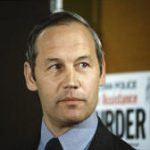
Scotland Yard’s former anti-terrorism chief, who investigated the Brighton bombing and helped bring Patrick Magee to justice, died in 2019, aged 82.
Commander William Hucklesby led the Metropolitan Police’s anti-terrorist squad from March 1982 to November 1984, during some of the worst IRA atrocities in Great Britain.
These included two blasts in London’s Hyde Park and Regent’s Park in July 1982 which left 11 soldiers and seven horses dead; a car bomb attack outside Harrods in December 1983 in which six people died and 91 were injured; and the October 1984 Brighton bombing at the Conservative party conference, which killed five people and injured 34.
During Mr Hucklesby’s time at the helm of anti-terrorism, revised IRA methods of operating in small, self-contained units led to fewer arrests than those that followed attacks in the 1970s.
While there were occasional criticisms of police strategy, Mr Hucklesby was almost always able to identify his suspects even if they had fled beyond his reach.
At a press conference following the Brighton bomb, he rebutted claims by unnamed “security sources” that his suggestion the device that blew up the Grand Hotel could have been planted weeks earlier was a case of the police “covering up the inadequacy of their own security”.
He pointed out that police sniffer dogs had searched the seaside hotel before the conference to check for explosives but found nothing, which suggested that the bomb may have been wrapped in cellophane.
Mr Hucklesby turned out to be right on both counts.
Investigating officers swiftly narrowed the source of the blast to the bathroom of room 629 and began tracing everyone who had stayed in that room, including IRA volunteer Patrick Magee.
Magee stayed at the Grand Hotel a month before the conference, using the name Roy Walsh, and planted the bomb, wrapped in cling film, under the bath.
The device was fitted with a long-delay timer and detonated at 2.54am on October 12.
Prime Minister Margaret Thatcher was still awake, working on her conference speech, but escaped uninjured.
Magee was given eight life sentences at the Old Bailey in 1986, with a recommendation that he spend at least 35 years in jail.
He was released under the Good Friday Agreement in 1999.
Mr Hucklesby also played a central role in the probes into the attempted assassination of Israeli Ambassador Shlomo Argov by members of a Palestinian splinter group in Mayfair in June 1982; the Libyan embassy siege of April 1984 in which PC Yvonne Fletcher was murdered; and the bombing of the baggage area at Heathrow Terminal 2 which injured 22.
After retiring from the police in December 1986, Mr Hucklesby joined the retail conglomerate Sears as a senior executive with responsibility for group security, and was chairman of the security committee of the Oxford Street Association. He was a fellow of the Royal Geographical Society and the Royal College of Arts, a Freeman of the City of London and a member of the council of the British Foundation for the Study of Terrorism.
Mr Hucklesby is survived by his wife Josephine along with their son and daughter.
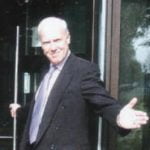
Dr. John Hudson passed away peacefully, at his Home in the U.S.A., on Thursday October 15th. 2009, at 4:50pm local time.
A Memorial Service for John was arranged by his sister Elizabeth and held at St. Andrews Church
Court Rd. Motingham, Nr. Eltham London S.E.9
oon the 4th November 2009
John’s was totally committed to both Holloway School and the Old Camdenians as Headmaster and President. Please read his review of the school and the club from their birth to 31st August 2004
Holloway School and Old Camdenians’ Club Centenary Retrospect (2009)
Read the conclusion by Dr.John Hudson OBE BSc.,MSc., PhD., Headteacher 1997 to 2004
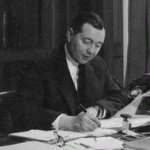
Sidney will be most affectionately remembered by OC’s as chairman, actor and producer for the Dramatic Society. Governor of the School (1969-81) and a long supporter of the Old Boys. He served the Royal Academy for 52 years and was its secretary from 1968-1982. , Sidney was a loyal, decent, courteous and a talented musician (as all attendees at annual reunions will subscribe). He became a Lieutenant Commander in the Royal Navy during the 39-45 war.
He was appointed MVO in 1967 and advanced to CVO in 1977. Even after Sidney retired he still maintained strong contacts with the School and gave a number of talks to boys about art, literature and music, subjects that were a revelation to many of them. Sidney introduced me to the dramatic society and was instrumental in my taking a great interest in the theatre. I used many of the techniques he taught me when in later life I conducted management development programmes at home and overseas. Sidney was registered blind when he died earlier this year aged 88. Many of us will always be grateful for knowing him and learning from him. (RB)
Albert Henry Thomas Irvin OBE RA was an English expressionist abstract artist.
Born in London on 21 August 1922 he attended Holloway School, and was evacuated during World War II, to study at the Northampton School of Art between 1940 and 1941, before being conscripted into the RAF as a navigator. When the war was over, he resumed his course at Goldsmith College from 1946 to 1950, where he would later go on to teach between 1962 and 1983 where he met and became good friends with Basil Beattie, Harry Thubron amongst others. He was elected to The London Group in 1955. He worked in studios in the East End of London from 1970 onwards.
Bert married Beatrice Olive Nicolson in August 1947. In the early 1950s Bert met and was hugely influenced by many of the “St Ives” artists including Peter Lanyon, Roger Hilton, Terry Frost and Sandra Blow.
He won a major Arts Council Award in 1975 and a Gulbenkian Award for printmaking in 1983.
His work is widely exhibited both in the UK and abroad, in such places as the Arts Council, Birmingham City Art Gallery, the Chase Manhatten Bank, the Contemporary Art Society, Manchester Art Gallery, Whitworth Gallery Manchester, Leeds City Gallery, Tate Britain, the Victoria and Albert Museum, Oxford University, Cambridge University and Warwick University Arts Centre.
His influences included Walter Sickert, Henri Matisse, JMW Turner, Jack Smith and and Edward Middleditch.
Bert was appointed officer of the Order of the British Empire (OBE) in the 2013 Birthday Honours for services to the visual arts.
Bert died on 26 March 2015.
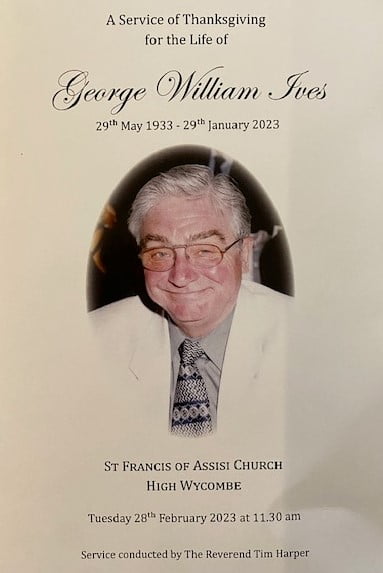
It is with great sadness that I have to inform you of the death at the age of 89 of George Ives, the Club’s Honorary Vice-President and a dedicated supporter of the OCC for more than 70 years. George died on 29th January, at Stoke Mandeville Hospital, with his nieces Jane and Jackie by his side, his death coming only a matter of weeks after that of his beloved wife Pam. Along with OCs Bill Wood, Alan, Janet and Lesley Meyer, Martin Quilter, Bob Pearson, Peter Sumpter, John Maskell, Peter Clayton, Patrick Jones and Gary Davis, I attended his funeral in High Wycombe, where at the wake we were able to celebrate his life with a rousing rendition of the school song. Denis Piggott
On the 29th of May 1933, George William Ives, was born to a family of Licensed Victuallers, at the ‘New Copenhagen’ public house, 274, York Way, London, N7. During the Blitz, in World War Two, George went to live with relatives outside London. In Loughborough. In 1946, George came to Holloway School where he enjoyed his sport and boxed for Great Britain. Some would say that he never left his beloved Holloway School, coming back to support the Old Camdenians Club for over seventy-six years.
George was offered a scholarship at Leicester University, but like so many others, National Service put pay to that. George served with the Royal Electrical and Mechanical Engineers (REME) spending a lot of time on Salisbury Plain. Also, four months in Devon on an Officer Selection Course. George passed with flying colours, however, at the final interview he truthfully answered that he was a publican’s son. The glass ceiling was evident – “What could a publican’s son bring to the Officers’ Mess”. His Captain was furious and put George up for another four-month course. Our tenacious George completed it and yes, the same people interviewed him again.
In the early 1950s, George was still on National Service and had a 48 hour pass to attend a St. Valentine’s Day dance in London. It was a blind date with a friend whose own girlfriend would be bringing her friend too. Well, Pam started ordering whiskey and ginger which blew all of George’s savings and certainly his fare back to barracks. He hitchhiked back to barracks in a fish lorry. He thought that by sitting in the cab with the driver his uniform would not be affected by the smell. Wrong, as he walked to camp he realised that he smelt like Bishopsgate fish market and spent the next two hours walking around the camp for the smell to go away. At 4am, George entered the Guard Room, however, the smell did not go away and he was certainly personae non grata and ‘Billy No Mates’ from then on. That is until he gets a parcel from Pam, which had to be singed for? George got a rebuke from his corporal, but was allowed to keep it. Apparently, Pam was Secretary to the Managing Director of Carreras, who had asked her to clear out a huge metal cabinet containing packets of every sort of cigarette on sale. They were used to test for quality against Carreras’ own brand. Well, ‘Billy No Mates’ became ‘King George’ and everyone wanted to know our George!
George had grown up with parents and grandparent involved in the ‘Trade’, who were great supporters of the Trade Charities. George’s grandfather served on the Society of Licensed Victuallers and the Licensed Victuallers’ School Board of Management and, George’s father become Chairman and then President of the Beer & Wine Trade Benevolent Society. George still had a Scholarship to go to Leicester University but thought he would like to be a journalist. He had a couple of reports published in the ‘Morning Advertiser’ but was not making any progress towards a full-time career.
George’s father was on the Committee of the Licensed Victuallers’ Lighter Fuel Benevolent Association. One evening he came home from a meeting of that Association and announced that he had given the services of George and the car to the Association for a month, to help distribute the Lighter Fuel boxes.
George duly reported to the Office and started to drive all over London and the Home Counties delivering the boxes. After a month, George was offered the role of Assistant Secretary of the Lighter Fuel at the princely sum of £4 per week. George decided to take it on, very much aware that his girlfriend, Pam, was Secretary to the Managing Director of Carreras, earning £21 per week. George and Pam’s courting days were spent travelling to various pubs installing the boxes and then having to revisit them again to fit the modification required to make the pump work more efficiently.
George was the one who came up with the idea of the circlip, which made the device airtight. Also, they gained an enormous amount of experience about the Trade and the characters who made up the charitable movement.
George employed a student, namely Judy Driscoll, to assemble the boxes. This involved inserting the advert, putting the circlip around the pump and, in some case, fitting a bottle of fuel into the receptacle. For this she was paid 1d. a box. Later she married, became Judy Nickless and many years afterwards was appointed Secretary to the LVNH Chairmen.
George’s father was now the Chairman of the Beer and Wine Trade Benevolent Society, but the Secretary resigned, and George told his father that he would like to try for the post. He categorically ruled it out and denied George the right to apply. Six months later the new appointee left, and George’s father’s Term of Office had been concluded. George applied and was successful but found out later that his father had supplied the Selection Committee with a list of everything in which George had failed, without any indication of those at which George had been successful.
George vividly remembers his first morning, when departing from home, his father uttering “you have exactly the same name as me and if you bring it into disrepute, I will swing for you!”
So, started seven years of exciting and rewarding employment and it meant that George could marry his fiancée, Pam.
On 23rd June 1956, George and Pam were married at the church of ‘Holy Innocents’ in Kingsbury and, yes, you guessed it the wedding reception was held at the ‘Earl Russell’ his parent’s public house, at 2, Pancras Road, London, NW1.
George and Pam had formed a partnership for life that would touch so many people.
George and Pam eventually acquired a house in Enfield and set to work decorating and furnishing it. In 1961. Len Frampton, Chairman of the Licensed Victuallers’ National Homes (LVNH) asked George if he would be interested in becoming General Manager of the LVNH. George thought that he would have no chance since he had antagonised ‘Uncle’ Arthur Hobart, however, Arthur would second the appointment.
George had achieved, what he thought at that time, the pinnacle of his ambition. George remembers bumping into an old school friend, Alf Mortimer, and dragging him into a local hostelry to celebrate his success in getting George’s dream job.
In his book, “ The History of The Licensed Victuallers’ National Homes” George describes how Licensed Victuallers came to set up a welfare system a hundred years before the Government; life at Denham and some ‘Magic Moments’. George states “I started my appointment on 1st May 1961 – I always joked appropriately – because that is Labour Day and that was my destiny!”. From General Manager, George would later become National Secretary, Chief Executive and finally the Director General. George was unable to recruit a shorthand typist replacement, Pam – always known in the office as ‘Matilda’ – came to help out as a Secretary. Pam slowly became a permanent fixture, although for many years she worked voluntarily and received no salary. Eventually, Pam became Head of the Office Staff and George says, “ was most competent and indeed trusted by all the staff, despite being married to me”. It was always a tradition in the ‘Ives’ family that the mother would be known as ‘Matilda’; George’s grandmother, mother and now Pam would all be called ‘Matilda’. According to Google it means ‘Mighty in battle’. Most useful in handling customers in those difficult pubs.
George and Pam worked 8am to 8pm most days at Denham. George remembers that he once took a phone call for Mrs Matilda Ives. George’s ‘bete noire’, was the Housing Corporation, who would lecture him about staff contracts. “They said that we had to be more precise and describe very accurately the duties of each staff member. I asked them what description they would give a person who was expected to sweep up, lay tables, stock bars etc. Their reply was “a Catering Assistant”. My response was that I called them shorthand typists!”
George has a chapter on the ‘Magic Moments’; such as when the Duke of Edinburgh visited Denham and someone stated, “ It was the only Old Peoples’ Home in the world where everyone, patients, staff, residents and Board Members all laugh!”
On the 8th of April 2014 George sent this message out to all OCs via his Secretary’s Note 2014-2: “It is with many regrets, that I announce my impending retirement as your Secretary. I have been in office for over 20 years and have enjoyed much of the work, particularly being in touch with so many of you, assisting where possible to trace other O.C.’s; connecting old school friends, organising the Dinner, the 50+ Club and compiling the Secretary’s Notes which I know from so many comments are very welcome. I am in the process of handing over to Raymond Rowe who will be more than capable. Many of you will know him from his present role as School Liaison Officer, in which he has had so much success”.
On the 28th of October 2022, George and Pam were guests of honour at the OCC 95th Annual Lunch.
During those seventy-six years the schoolboy from Holloway would share his time as Chair of School Governors; Honorary Life Vice President of the Old Camdenians, Secretary of the Old Camdenians; raising funds at numerous events, such as:- sport equipment for the school gymnasium; student bursaries; Duke of Edinburgh Award Scheme; the Beacon High school choir; the Chromebook Fund; and as a Trustee of ‘The Bill and Nora Wraight Old Camdenians Memorial Fund’. Then of course there are the legendary Annual Dinners and Luncheons, not to mention the Centenary Dinner in 2009! George and Pam have meticulously planned and executed each event. Assisted by Ann Tennant and her team they have been providing the meals for Old Camdeninans’ events for over twenty years.
George and Pam were married 64 years.
George William Ives died on 29th January 2023, aged 89 years.
Pam predeceased him on 6th December 2022, aged 92 years.
The Old Camdenians owes a great debt of gratitude to George and Pam for their inspiration, wisdom, sense of humour, love of life and caring nature. Their legacy and place in history needed to be documented.
Dr Raymond Rowe,
Honorary Secretary Old Camdenians Club.
Some extracts from George Ives’ book, “ The History of The Licensed Victuallers’ National Homes”;-
“ It is a tribute to the ‘Society’ that so many dedicated men wished to serve their fellow licensees by devoting their time to the Board of the LVNH. I used to liken the Chairman’s duties to that of a Mayor of a Borough, except that the Chairman’s Borough was the British Isles.”
“I always maintained that the only ‘product’ we could give in return for money was a thoughtful and, above all, sincere thanks. This policy greatly enhanced the reputation of the LVNH, and I can say was the envy of members of the sister Charities. Much of this reputation was garnered by Judy Nickless who brought much credit to the organisation”.
George explains how the Homes’ fully-fledged ‘mini market’, specializing in small portions, was his brainchild. He had seen a resident buying an arrow-root biscuit at the bar.
An attempted robbery at the Home where ‘some local villains were planning to stage a hold-up and steal the LVA’s takings – £100,000’. Fortunately, it was foiled.
If you would like an e-copy of George Ives’ book, “ The History of The Licensed Victuallers’ National Homes” please email admin@oldcamdenians.info.
More tributes received via email below :-
Alan Meyer
George was a very proud Old Camdenian. Associated with the Club and School for over 70 years. Level of commitment to both in that time was beyond measure.
Joined O.C.Football Club on leaving school. Gained reputation for fearless style of goalkeeping. Regular broken bones, and dislocations. Pam waiting at home in trepidation. Never a dull moment for team mates. Set an example with his enthusiasm and sportsmanship.
fter playing days over, became O.C’s General Secretary. Continued to serve Club and School with distinction. Worked tirelessly to maintain and improve relationship with the School. As a result, both now on very good terms together.
Made significant contribution as a School Governor, particularly in role of Vice Chair of the Board. Actively supported many schemes benefiting pupils.
Enjoyed organising Club’s Annual Reunions. With his Toastmaster’s skills, was an ideal Master of Ceremonies. Presided over many memorable occasions, eg Centenary celebrations for School 2007, and Club 2009.
As saying goes, ‘Behind every great man there’s an equally great woman’. Never truer than here. Pam’s quiet support for George, and the Club invaluable over so many years.
Remarkable couple. Held in the highest regard. Their humour, kindness, and, above all friendship greatly missed, but never forgotten.
James Brown
I am so saddened to hear of George’s death. He was a kind Gentleman always thinking of others. And faithful to the Camdenians. IT must have been a big tragedy when he lost his lovely wife Pam and must have been lost without her. Pam was his Rock. The Camdenians will go on, but it’s a big loss to us. As I don’t know life with the Camdenians without him and his good wife. But he has left a great big Legacy. And will never be forgotten. I SAY Thank you George and Pam now they are together in Heaven for inviting me in all them years to a great meetings and dinners without you I would have not done so. Rest in peace
Sarah Evans
Really sorry to hear about the passing of George, especially so soon after Pam.
Thoughts are with his friends and family.
Ted K Ling
Thank you for informing us of George’s transition. I am saddened to hear of his passing so shortly after his wife Pam died last year. I only had a fleeting encounter with George when I attended one of the OC Dinners a few years back, but I found him very kind and giving and his speech touched my heart (even with a “public broadcast” that I had travelled from Switzerland to be at the dinner). I bought a school tie at that occasion which is still a great article of remembrance. I KNOW that George and his wife Pam did a LOT for the school and the Old Boys and we are all grateful for his enduring support. Amazing how such a short meeting is still in my mind! Please pass on my deepest condolences to his family. I wish them well in this time of need.
Jane Steele
Jacky forwarded the email you sent out – thank you for writing such a touching tribute. Jacky was also with George when he passed yesterday morning – we know that he knew we were there, and sincerely hope he found comfort in that. We will, of course, keep you informed about the arrangements. Today we are desperately sad, so soon after Pam – and a man with a larger heart and dollop of integrity I have yet to meet.
Steve Cruse
He was a lovely person sorry to hear about him please send my condolences to his family, my wife has cancer so I won’t be able to attend any further meetings unless I’m able to find a suitable career.
Brian Heard
What a terrible shock. I was only speaking to George at the annual dinner a few months ago. He will be sadly missed by all. Thanks for that Ray, but we are off visiting my daughter in Australia for six weeks starting next week so probably won’t be around.
Alan Shearn
Well, well we’ll. A sad loss. Both gone at a good age but offering their services to the club right up to the end.
Kim Harrigan
This is such sad news to read. Sending my condolences to George’s family.
Bryon Barnes
Deeply sad to know George Ives passed away in his sleep on Sunday morning.
It was a great honour for me to have known George. He was a passionate, loyal, and devoted lifelong servant of the Old Camdenians. George Ives will never be replaced. Thank you, George, rest in peace.
Peter Gourri
I confess to feeling a little crushed by the news. George was someone that you got used to always being there. The fact he is gone makes the world a slightly lesser place. BUT what a life he led and a mark he made on this universe of ours. When I first joined the OCs in my late 30s, I was (and remain) the only one from my peer group of 1981-1986 to be involved and frankly wondered if I had done the right thing. George explained that he was happy I was there as my period was known in OC circles as the “wilderness years.” He promptly made a point of personally introducing me to the persons present, ensuring I knew all about them and leaving me feeling comfortable and “at home.” He was a lovely man who would keep in touch from time to time by email or Facebook. My thoughts are with his family at this sad time.
John Bradford
Deeply saddened by this news. A contemporary of my brother Lionel.
Bill Wood
I am deeply saddened to learn of George’s passing. In fact it has left me feeling rather empty.
I first met George soon after assuming the role of Head of PE at Holloway school in September 1999. He warmly invited and welcomed me to my first Old Camdenians annual dinner in November that year. It was immediately apparent to me that he was the face of the Old Camdenians and to my mind will take some dislodging to not be considered the archetypal ‘Mr Old Camdenians’.
Soon after my arrival at the school I served four years as a staff governor whilst George was Vice Chair of Governors. It was in this capacity I was able to witness first hand his unflinching dedication to the school and in particular the students. In his time as a governor the school went from being an all-boys school to mixed with the introduction of girls early in the new century. Even when the school name changed to Beacon High in 2019, George’s service to the school never wavered. He strived to create a lasting legacy of football competitions with our feeder primary schools through the Bill and Nora Wraight Memorial fund, before the pandemic unfortunately put paid to those plans.
However, it is on a personal level I will most fondly remember George. Often greeting me as “William”, he was almost father-like to me (my father being one of the only other people to still call me William). He seemed to have an endless supply of witty one-liners with each greeting and l’m honestly not sure if I ever heard the same one twice in 23 years!
I feel incredibly honoured to have had the privilege to sit next to both Pam and George at their final Old Camdenians lunch last October (they swapped seats during the meal). I shall miss them both dearly and those occasions will undoubtedly never be the same without them.
I wish l could thank George for being a model human-being and quite simply an inspiration.
Martin and Kellie Hodgson
Thank you for informing me of the very sad news about George. Your email was an appropriate tribute to both George and Pam. I would very much like to attend George’s funeral.
Ian Kelly
Much love to George’s family and the Old Camdenians. I was so saddened to receive this news. May they both now rest in peace.
Denis Piggott
That is indeed sad news, if not entirely unexpected. We are meeting next week, when we can discuss how we can commemorate George’s (and Pam’s) lives and their extraordinary devotion to the club.
Marta Monteiro
My condolences to Mr George’s family and friends, I really was not expecting to hear this news. Mr George was very friendly and welcoming when we communicated through email before and during the 1st Camdenian club reunion I attended. May he rest in peace.
Ray Rowe
Thank you, George, for all that you have done for your beloved school over the past seventy-six years. You told us that you were at Holloway from 1946 to 1951, but we know that you never really left. In your roles as Honorary Life Vice President of the Old Camdenians, Secretary and Chair of School Governors, you have been an inspiration to all. We feel that much better for having known you.
Dennis Warwick’s Poem to George
‘APPRECIATION FOR A MAN AND A LUNCH CHAPTER ABOUT TO CLOSE’
“Regretfully George, I’ve not known you for as long as most,
guess first meeting was at one of the lunches you host.
Regaled for your decades of dedicated service to the OCC,
and whatever the stress, a gentleman to all, including me.
You’ve achieved success in so many schools associated roles,
that, if they ever had one, George you would be top of the polls.
But, for now, one of your many tasks is coming to an end,
so just a few lines from an OCC member, can’t claim friend.
I’ve enjoyed lunches you’ve organised over so many years,
and the atmosphere they created for me and all my peers.
So, this is just a poor rhyme, to say thanks from a sincere fan,
to you George, you will always remain one special gentle man.”
Ray Rowe
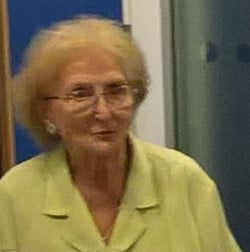
Pamela Audrey Ives (nee Driscoll) was born in Kingsbury, on 21st September 1930. Pam met George at a Valentine’s dance when George had a 48 hour pass from his National Service duties in the army. They married at Holy Innocents Church, Kingsbury on 23rd June 1958….and the rest is history as they say. Pam was George’s tower of strength and a stalwart supporter of the Old Camdenians Club. I refer to the Tribute we made to these two stars in 2020. Read why George affectionately called Pam ‘Matilda’.
What a wonderful couple; who over a 75 year span would do anything for us – thank you Pam. I will certainly miss your counsel and advice. George and Pam were our guests at the 95th Annual Lunch, on Friday 28th October 2022, at the school. I know that they both enjoyed sitting at top table.
Pam died on 6th December 2022, with George by her side. Pam was aged 92 years. Our sincere condolences to George and family at this difficult time.
Pam’s funeral took place at 11.30am, on Friday 30th December 2022, at St Francis of Assisi Terriers, Amersham Road, High Wycombe, HP 13 5AB. The burial was a family internment. Afterwards a wake for family and friends took place in the church hall. Ann Tennant and Shaz were on hand to ensure that everyone had hot soup; tea; coffee; wine and plenty to eat. George was supported by family and friends to give Pam a big send off. Representing the Old Camdenians was Peter Sumpter, Bob Pearson, Martin Quilter, Bill Wood and Ray Rowe who said a few words on behalf of the OCC thanking Pam for her valued support and contribution to the club.
Also, there were sixty-four red roses too – one for each year of Pam’s and George’s marriage in 1958.
Ray Rowe

Tom was born in Berlin in 1928. He escaped to the UK in 1938 and, after wartime evacuation to Dorset, returned to London in 1945 to join the Science 6th Form at Holloway School. He left in 1947 with five excellent Higher School Certificates, which he put down to the tuition and encouragement he received from ‘Bump’ Brown (physics), Doc Atkinson (chemistry) and ‘Bunny’ Griffiths (pure and applied maths), all of whom he regarded with great respect and affection.
After becoming a British citizen he was called up into the army. Having completed his army service, he entered London University in 1949 and graduated in physics. A long and varied career followed, first as a physicist at the Mallard Research Laboratories then as a Divisional Director with Phillips which took him to various parts of the world. He then became a Management Consultant. Ultimately, leaving business behind at the age of 50 to took to teaching and became a teacher of physics.
In retirement, Tom continued to travel widely with his second wife, Joyce, and pursue a diversity of interests including sailing, water colour painting and stained glass windows. Tom came late to the Old Camdenians and thoroughly enjoyed those reunions he was able to attend, particularly the two occasions when he was the oldest member present. Typically, he attributed his longevity, in part, to the occasional glass of whiskey and/or red wine, taken for strictly medicinal purposes.
He had a fertile and inquisitive mind and was never happier than when he was tackling an apparently insolvable problem and finding a solution. The tributes from his family and friends at his funeral, reflected his warm friendship, kindly nature and endless fund of stories told with an impish sense of humour, all of which will be greatly missed by those privileged to have known him.
Tom’s remarkably full life ended peacefully in hospital on 26th April 2019, two weeks after a sudden and major stroke. Our sincere condolences have gone to Joyce and his devoted family at their very sad loss.
Alan Meyer
TN Jones, or Norman as he preferred to be called, was born in Leeds on the 12th of June, 1920. His father was a teacher in Leeds but was of Welsh extraction. Norman attended Leeds Grammar School until 1929, when he became a student of French and German at Leeds University. He graduated on July 4th 1932 with a Double First in French and German. This was two separate degrees, not a Joint degree as came to be the norm later. During his time as a student he had also attended both the University of Breslau (as it was then) in Germany, and the University of Strasbourg in France. I assume he joined the teaching staff of Holloway School as a Modern Languages teacher straight after his graduation. Certainly he was evacuated, with his young family, to the Towcester area with the school in 1939 at the outbreak of WW2, and while there also served in the Home Guard as long as he was able.
He married Margaret Haslop in December 1935 in Leeds, and had one daughter, born in May 1939.
He died at Leeds Royal Infirmary in December 1941 from acute myeloid leukaemia.
My mother, his widow, remarried in April 1943. Her second husband was RJ King, also a master at Holloway School.
Kathleen Maxwell
(PS Below are two photos of Holloway School visiting Cologne in 1936. Norman is second on the left and Margaret is second on the right. Please see obit for RJ King too)
Ray Rowe
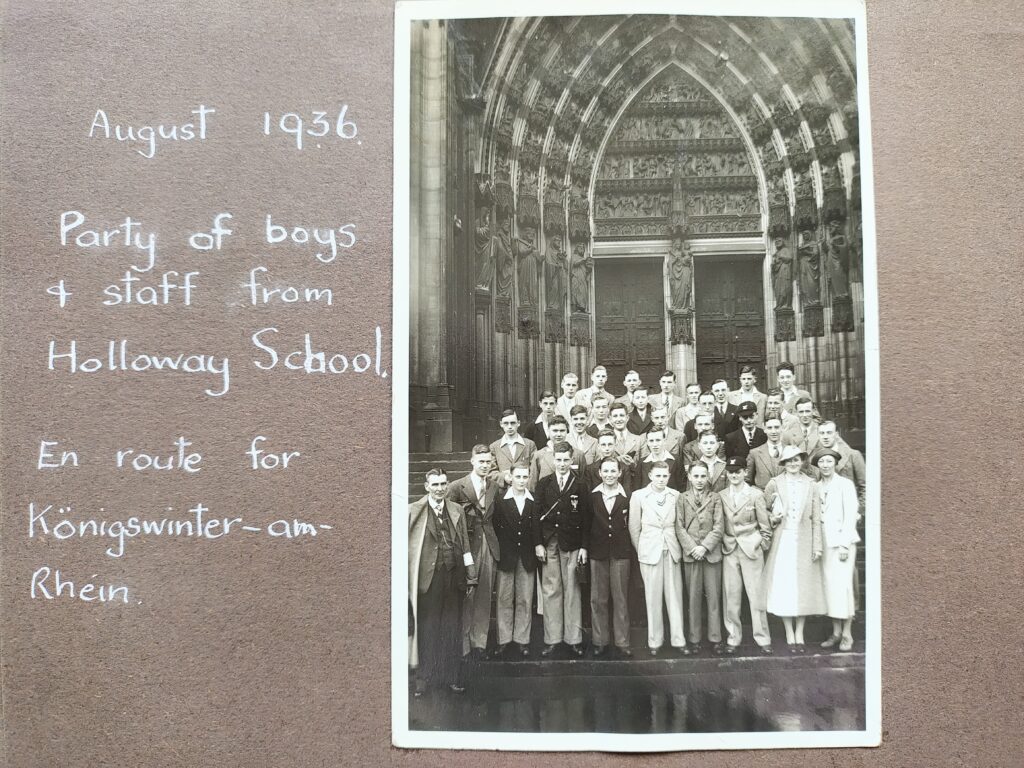
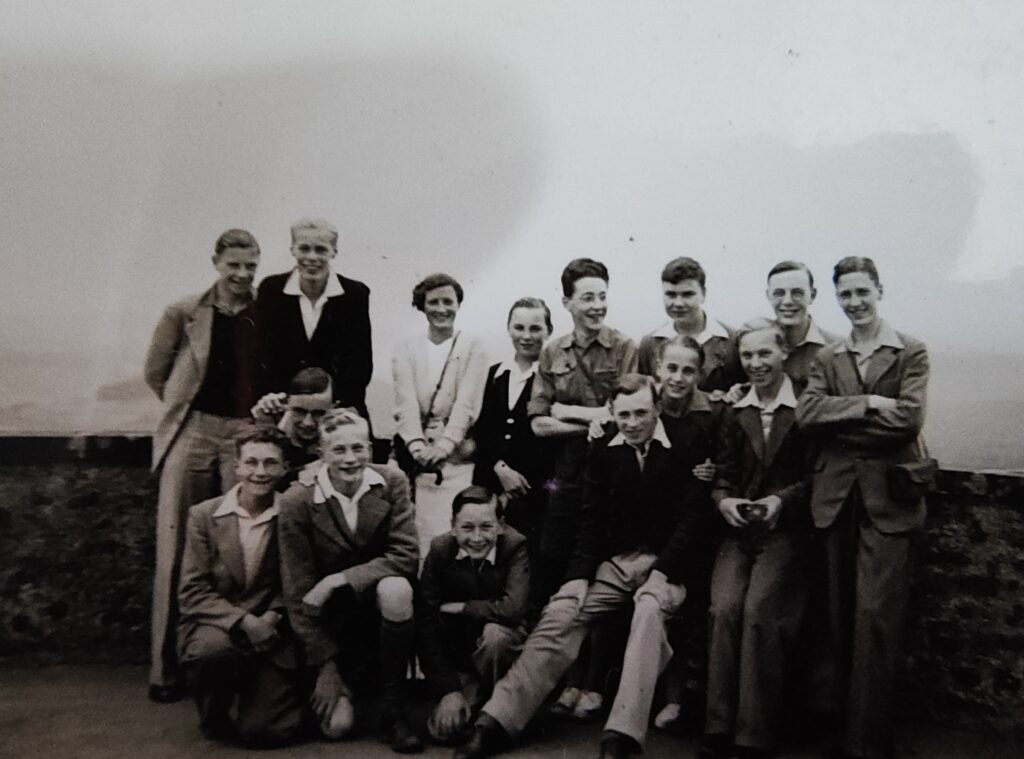
Ray Rowe
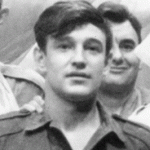
Brian Kelly died peacefully after an illness lasting sixteen months. During his National Service, Brian served in Malaya with the Intelligence Corps. He was a member of the successful 1950’s Old Camdenians cricket club 1st Xl along with Dennis Steel, Paul Yates, Gordon Wing, Charles Simpson, George Robb, Alan Kirby, Bill Wraight, Mick Larner, Alan Cornelius, Bert Weedall, Richard Brown, Brian Collins, Sid Brittin and others. In 1951, Brian was part of the first OC’s cricket club touring side after the war. He was also a member of the OC’s Dramatic Society where he performed a number of leading roles.
In 1958 he was joined by Alan Cornelius and Richard Brown trekking the summit of Mount Pilatus. It was there that Brian first had the feel and passion for mountains and mountain climbing. He later joined TWW (ITV) in Bristol, as a cameraman (including Outside Broadcasts) and in1968 joined the BBC Natural History Unit where he acquired his professional name of ‘Ned Kelly’ and stayed for a long and successful career as a documentary maker and later a producer. He was a television photographer for several of the BBC documentaries of Mount Everest expeditions. Ned was co- producer of the David Attenborough series ‘Life in the Freezer’ and ‘The Living Planet’ . He retired from the BBC to pursue his career as a freelance producer and mountain guide. He led many trekking parties in the Himalayas and the Kingdom of Bhutan. Brian was godfather to my son. He married Suzanne and his two children, Hugo and Zoe both graduated. Hugo is now with the Foreign and Commonwealth office and Zoe is a graphic designer in Stockholm. Brian (Ned) Kelly was intelligent, interesting, modest, kind and possessed a great sense of humour.
He died in 2014. At his memorial service the dress code was walking boots and wellies.
We extend our sympathy and condolences to Suzanne and family.
RB

I was clearing out a top shelf, while I am still able, and discovered some photographs from my stepfather’s time at Holloway School. He was RJ King.
Richard J King was born on 5th August 1904 and was a pupil at Holloway School from about 1915 when he must have gained some kind of scholarship. Prior to that he had attended Burleigh Road school, I believe.
He went up to Cambridge in 1923, and graduated from Christ’s College in 1926, gained a teaching award in 1927, and a Masters degree in 1930, also from Cambridge. His subject was History, and his speciality was Constitutional History.
His first teaching post was at Dorchester Grammar School. I am not sure when he took up the post at Holloway, except that it was probably around 1930.
He was evacuated with the school, as indeed were my father and mother, to Northamptonshire when WW2 broke out, to Towcester, Paulerspury, and Hulcote. In fact Holloway School played a very large part of my life from the age of three months, when I was taken to my first summer camp at Royden in Essex.
He married my mother in the Spring of 1943, after the untimely death of my father, TN Jones, formerly a master in the modern languages department of Holloway School, from acute myeloid leukaemia in 1941, and became, not Uncle Richard any longer, but my Dad. And a great father he was to me, seeing me through my childhood, my rebellious teenage years, my departing for St. Andrew’s University, to my marriage to a Scot from Edinburgh whom he made very welcome as part of his family, and as a much loved grandfather to our two daughters.
It was with great sorrow that he eventually had to leave Holloway School in 1953 to take up his new position as Head of Highbury School, just down the road. Holloway had been his life, and ours, for so long that it seemed strange not to attend the many functions held at the school anymore. There had been speech days, Red House parties, cricket matches up at the sports field in North Finchley, summer camps for forestry, or harvesting, or fruit picking , Open days, and suchlike that we all missed. But life goes on, and he served as Headmaster at Highbury School until it was comprehensivised in, I think, 1965.
My parents then moved to York in their retirement where RJK discovered a love of gardening, and visiting gardens. And visiting my new home in various areas of Edinburgh and Fife.
Richard J King died on 6th June 1976, aged 71 years, his sudden death came as a great shock to us all and left an enormous hole in our lives which remains to this day. His funeral and cremation were held at Warriston Crematorium in Edinburgh , a very quiet affair with just my mother, myself and my husband present, and one or two others whose names I didn’t know. He had dropped dead at Ratho, near Edinburgh, on the way to visit us for a holiday on the first day of the notorious heatwave of 1976. He had just parked the car to see if a hub cap had dropped off a wheel. My mother thought it had. His heart, which was weakened by illness, just gave up in the heat. It was a terrible time for all of us, but it was quick for him with little suffering, and little fuss. He did hate fuss! He had reached his three score years and ten, much to his own satisfaction, but if only he could have seen his two granddaughters grow up and go to university. He would have been so very proud of them.
He was a great person who made the lives of all who came into contact with him the better for knowing him. He had a knack of realising the potential in his pupils and encouraging them to fulfil it.
I also acquired quite a few honorary uncles among the masters from my stepfather’s time as master at Holloway. There was Alain Ahier, whom we visited later in his native Jersey; Ted Griffiths, who gave me, and my younger daughter, our first teddy bears; Bill Seitz, who was extremely angry with me at a forestry camp when he saw me at the age of six wielding a billhook to swipe at nettles; Theo Crabtree, whose son was of an age with me; and Leslie Pond who we visited in Bournemouth whither he had retired with his formidable wife, Queenie; amongst others. I remember also that after Dad had completed the Times crossword each day, in pencil of course, he would rub it out and hand it to Doc Atkinson to do who I don’t think had access to the Times.
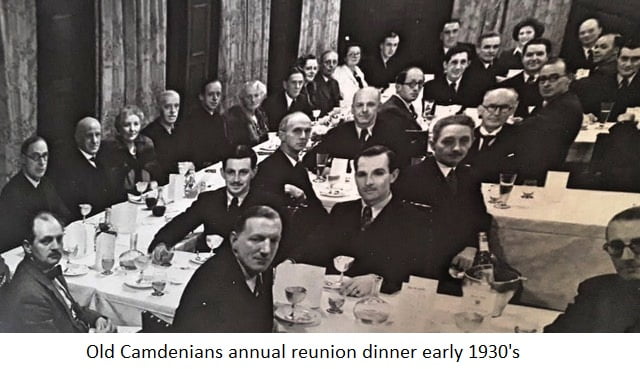
R J King sitting at table centre left of Old Camdenians reunion early 1930s.
Ray Rowe
Albert Reginald Knight’s parents William and Martha were a journeyman butcher and laundress respectively and he was their fifth child born at Holloway on the 30th November 1900.
Educated at the Camden Secondary School for Boys, in Holloway, Reggie won the national schools Junior Graceful Diving Championship S.C.A.S.A in 1919 whilst still a pupil there.
In 1920 Reggie became a member of the Otter S.C. He was placed 2nd in the ADA National Diving Championships in the high board event in 1920 and duly won the event in 1921 and 1922. He was runner up at the 1923, 1924, 1925, & 1929 ADA Championships.,
He represented Great Britain at the 1924 and 1928 Olympic Games. In 1924 in Paris he was placed 7th in the Plain High Diving and 11th in the Platform Diving events, and four years later at the 1928 Amsterdam Olympics he finished 8th in the Platform event.
In 1926 at the first European Championships, held in Budapest Reggie Eric MacDonald both went under their own steam as unofficial entrants, and he won a bronze medal in the plain high diving event. He can as such be considered Britain’s first competitor at a European Championships. He also represented England at the European Diving Championships in Bologna, Italy in 1927.
Reggie later went to Imperial College London, and became a research chemist. His research work subsequently took him from London to the Scottish border town of Jedburgh, where he became President of the Jedburgh Swimming club.
He returned to London to live in Hillingdon in the 1930’s and later died in Romford in 1964.
RH
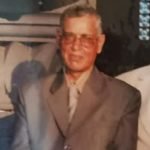
Claude de LaPeyre was born on 3rd June 1949 and died on June 7th 2008 in Mauritius, aged 59 years, after being murdered by an employee who was burglarising his home.
Claude is survived by four sons and a daughter, Boris, Thierry, Nicolas, Gregory and Elodie, and eight grandchildren, Amelie, Yurika, Thea, Chan, Emanuelle, David, Ciara and Tyron.
Claude’s family came from Mauritius to the UK in October 1962 and he was brought up in the Finsbury Park area of north London. He attended Holloway School where his overwhelming passion was biology.
The head of the biology department, Darrell Kay, was a larger than life character who encouraged open conversation with his 6th form students. This created an atmosphere where students were encouraged to talk and discuss all matters, the news, biology… everything.. The biology lab became a haven and none of the class had ever experienced anything like it before. He and Alan Massey taught the then new Nuffield ‘A’ level syllabus which encouraged students to develop their own research projects. Students also had free passes to London Zoo, so Claude and his classmates spent many hours with the animals without any distraction. A hospital even gave the department a dialysis machine. Claude responded splendidly to this approach to teaching, as did his fellow classmates Craig Hinkins, Stavros Kallis and I…
After the ‘A’ level exams Claude and I went to Finland to spend the summer with my relatives. We had never reckoned on the fact that people in parts of rural Finland had never seen a black man before. Everywhere we went people would stop and look at Claude, and especially the children. They would stop, often sit down and stare open mouthed and after a pause their parents had to tell them to move on. The Finns are very polite so it is very innocent. They had never seen a man like Claude before. Claude soon got used to it and took it in his stride. We had a great time in the forests and on the lakes, exploring, boating, fishing, swimming, having saunas and enjoying the friendship and hospitality of the Finnish people. We also taught the Finns to play cricket.
He went on the study and be awarded a degree in zoology at Portsmouth Polytechnic in 1971. After working in a number of UK laboratories, in 1975 he moved back to Mauritius, something he had spoken about many times to his friends, Craig Hinkins and myself.
He worked for a time on government research projects on toxic poisons, but after a few years ventured into agriculture establishing a small farm with livestock. Claude was later to say that it was his experience in Finland that led him to want to become a farmer.
Claude slowly developed the farm specializing in the breeding of quality pigs, cows, chickens and he was the director of the Glenside Meat Processing Enterprise, in Pailles.
Claude lived modestly and did everything with passion and love. He applied his knowledge of biology to become an innovate and successful breeder. He was a lover of the land and enjoyed nothing more than spending his time on his farm with his animals. People who came to the farm often confused him with a gardener and he had much fun playing this role.
Claude was a modest, kind and gentle man who quietly helped many people without making a fuss. He was devoted to his children and he had even assisted his would be murderer by helping with the funeral of his father and later his younger brother.
His passing leaves a hole in the hearts of many people who had the privilege of knowing him and being his friend. His family are heartbroken by his passing.
RH
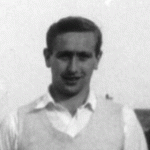
Eulogy given by Richard Brown at the funeral of |Mick Larner.
I first met Mick, for that was his name to us, when he left Holloway School and joined the Old Boys.
He was one of those talented sportsmen who would be selected for the 1st X1 for both cricket and football. He coupled his natural sporting abilities with determination, energy and enthusiasm.
His bright, fresh complexion, blonde hair and quietly spoken voice gave him a somewhat angelic appearance. Though there was nothing angelic or quiet about his hard resourceful play – or his crunching tackles on an opposing forward who might dare to try and pass him on the football field.
At cricket he bowled quickly – his square shoulders – swinging arms and strong slender physique proved him to be an efficient wicket taker. He batted in the middle order – more of a Flintoff than a Boycott.
His commitment to the team was always 100% – as it was to his family team.
Mick wasn’t a comedian. He didn’t tell jokes – yet he enjoyed laughter, was happy and could see the funny side. Off the sports field he was a gentle person. He was fun to be with.
Just over 44 years ago I was privileged to be the best man at Mick and Peg’s wedding. What was so outstanding about that day was the laughter; it was such a fun occasion..
He played squash. On court he was a fierce competitor. He would run and run non-stop. His legs would keep going to the final point – whether won or lost.
He later took up golf – displaying a full natural swing in his drive. Then the methodical final putt played with the concentration of a qualified accountant – which of course he was.
Throughout his family life, Mick revealed those same characteristics that he had shown so well in sport. He was dedicated to his family; committed to the family team and to the job in hand; He was loyal and fair; He was open and honest; With Mick.“ what you saw was what you got”.
He had Faith, Hope and Love. He was a good man – a good man to have on your side.
Whether you knew him as Mick, Mike, Michael, Dad or Granddad, cherish his memory and remember him just as he was to you.
RB
I am writing to let you know that my father, Laurence Anthony Leonard a.k.a. Tony Leonard passed away on 18th September 2022, at the age of 94. Dad was born on 8th October 1927, in Kentish Town. In his later years he suffered from Alzheimer’s, and one of our great pleasures was to show him the photos of his Old Camdenians football team, which would always spark some deeply held memories. I’m delighted to see him mentioned in Dickie Bird’s obituary.
Eulogy given by Tony’s son Richard
Good afternoon everyone. On behalf of the family, I’d like to thank everyone who’s joined us here
today to say goodbye to my beloved father, Tony. The support of friends and family has been a
great comfort.
When Dad was born, we had a conservative Prime Minister and a King, so things don’t appear to
have changed that much. In reality, Dad, like the Queen, saw more change in his lifetime than
anyone before him, and any of us.
Dad’s early life was shaped by his surroundings and upbringing. His mother was one of thirteen, so
there was an abundance of uncles, aunts, and cousins in his life, some of whom I remember, some
of whom could be described as colourful, and some of whom sound downright eccentric. I’m told
that house parties would culminate in the family conga-ing down Dunnollie Road.
As a youth, Dad’s main source of pleasure was football, and it was it was his Uncle Ralph that
began his lifelong passion for Arsenal, taking him to reserve matches. Dad would tell us proudly
over dinner how he played football at school with George Robb, who went on to play for Tottenham
and England, how as a small boy he was passed over the heads of the massive crowds so that he
could sit in front of the hoardings, only to be passed back once the game had ended, and how he
was present at the famous Stanley Matthews cup final. When he left school, he continued to play
for his old school team the Old Camdenians, named after the original name of the school.
When I took up football, he was an ever-present supporter, and along with Ken and Peter his
colleagues from British Steel, they became the main source of transport for the team. I could
always tell when it was my father shouting from the touchline, as he never lost his north London
Accent.
His other hobbies included long walks with the various dogs we owned, and making his own wine
and beer; many a Christmas party deteriorated as people under-estimated the strength. And let’s
not forget Dad’s marmalade, better than any you could buy in the shops. He got the recipe when
he and Mum visited the Ideal Home Exhibition when they were first married. He made it every year,
but he never wrote the recipe down, and now it’s lost with him.
He also loved to read, mainly history and non-fiction, and would visit the local library weekly to
replenish his stock. He also remembered everything he read. It was a cruel blow for him when his
eyesight deteriorated, but he switched to audio-books and true to form, never once complained.
Those who remember him when he was younger will know that was never without his beloved
pipe. It made Xmas present buying for him easy, until he gave up. I once asked him when he
started smoking. ‘At fourteen’ he said, ‘on the school roof.’ ‘with a pipe’.
Since Dad passed away, I’ve been struggling to find the words to describe him. Once I’d settled on
some, my cousin Christine wrote to me with the very same words. Dad was calm, kind and gentle,
with a great sense of humour.
He was calm in a crisis, never seeming to be flustered. He always gave me the best advice, but
never pushed his decisions onto me, always quietly letting me realise that he was right. He was a
gentle man, I don’t ever recall seeing him argue. When I followed him into the steel industry the
same year he retired, whenever I met someone I faced the inevitable question “Are you Tony
Leonard’s son? ” When I said I was, I always got the same response “ Tony was a true gentleman”
Above all he was kind to everyone he knew, and particularly devoted to his family. The way he and
Mum raised Jane and included her in every aspect of our lives is a shining example to all. When
Mum’s health started to fail, he cared for her unfailingly, and never once complained. When she
spent time in hospital, he visited every day, even though it took two separate bus trips to get there
and two back.
Dad wasn’t an outwardly emotional man, but when we lost Mum and Jane in the space of some ten
weeks, having cared for them for so long, I think it broke his heart. He told me once over one of our
chats at the kitchen table in Ewenny how he simply couldn’t get used to making just the one cup of
tea. Well now they’re back together, and Dad can make all three again.
Richard Leonard – Son
I was very saddened to read that Tony Leonard had passed away. Tony joined the OCFC in 1948, and, along with others of that vintage, made a valuable contribution to reviving the Club’s fortunes after WW2, and, indeed, those of the main OC Association. He was always willing to help, and served in many capacities e.g. 3rdXI captain 53-56, 2ndXI captain 57-58(Divisional champions), and as editor of the OCFC regular bulletin.
As a player, he was a hard tackling, but always fair, and sporting ,defender. He, and I, were members of the 3rd XI which won the LOB Minor Cup Final in 1958/ 59, 4-0, against Old Cheyneans. Despite the scoreline, we were on the defensive for most of the game, but Tony’s calming figure at right back played no small part in ensuring we kept a clean sheet. I have a team photo which is, possibly, one of those to which Tony’s son, Richard, refers.
A genial, and, genuinely friendly, character. Tony will be remembered in OC circles as a great clubman, as well as being sorely missed by all who knew him. Can I add my condolences to those which have, no doubt, already gone to his family.
Alan Meyer
Mr C F Lewis started work at Holloway Comprehensive School as Deputy Headmaster to Mr M W Brown. He became headmaster in 1960 and retired in 1973. When he was a boy, he had attended Bec School in Tooting. He excelled there becoming Head Boy, Vice Captain of the Rugby team and was a crack shot gaining the Bell Medal at the rifle club. He went to London University and obtained an honours degree in French and Latin.
His first post was as assistant master at Mitcham Grammar School. Staff were needed to take boys camping – at Morgat in France, and thus he was introduced to the camping life and bought his first tent.
During the war, he became a P T Instructor in the RAF at Filey, taught gunnery and was subsequently commissioned and sent out to Penang. In 1948 he married and had two daughters, Clare and Barbara: Barbara is now Head of Modern Languages at Winchester College.
From Mitcham he moved to Holloway which, at the time, was one of the first comprehensives in London with approximately 1300 pupils. With Fred Lindgren, an Old Boy, and his wife, he took his daughters to camps that were organised for boys who could not afford to go on holiday. They all went on expeditions with the boys. He became a sailing enthusiast and many holidays were spent camping and sailing all over England with his daughters. Walking was another hobby that he pursued – again with his two daughters.
In 1973 he retired and moved to Emsworth at the head of Chichester Harbour where he had a boat. He became Commodore and later Treasurer of Emsworth Cruising Association. He taught part time near Chichester and became a School Governor in Havant.
When the boat was sold he was accepted as a member of Chichester Arts Society excelling at not only producing very high class portraits but also landscapes. Many of his pictures were sold privately at various exhibitions and his portraits were often bought by the people who sat for him. He held two posts of office for the Chichester Arts Society and often kindly helped other members by taking them to weekly evening demonstrations etc.
He was modest, multitalented, even embarking on learning to play the classical guitar in his 80’s. He moved to Cornwall to be near his eldest daughter, Clare, enjoying visits to local projects like the Eden Project and the National Marine Aquarium in Plymouth.
Although battling with cancer for the last 13 years, he remained a gregarious man with a strong sense of fun. With all his talents, energy and warmth, and wide circle of friends, he touched an enormous number of people. His influence would always be a good one and far more than most people would be able to exert.
He kept in touch with his former colleague, Mr M W Brown (known as Meredith) up until he passed away aged 98. Mr C F Lewis died in April 2005 having reached the age of 91.
Clare Austin – Daughter
Fred Lindgren died peacefully at a nursing home in Southampton. He was held in the highest esteem and will be long remembered as a kind and gentle person. He gave most generous support to the school during his long and distinguished career. He introduced many school leavers to the world of accountancy. Fred was a past Governor of the school and was a dear friend and colleague.
Fred was a quiet, reserved and private man devoted to his wife, Mary and to his children and grandchildren. If was typical of Fred’s generosity and that of his daughter, Sylvia who arranged for donations in Fred’s memory to be divided between the RAF Association, for whom he did a great deal of benevolent work and the Old Camdenians.
Jo and I visited Fred in the Southampton nursing home just before he died. Although frail and blind he was, at the age of 93, mentally alert and could still calculate mental arithmetic.
All those who knew him will respect his memory.
RB
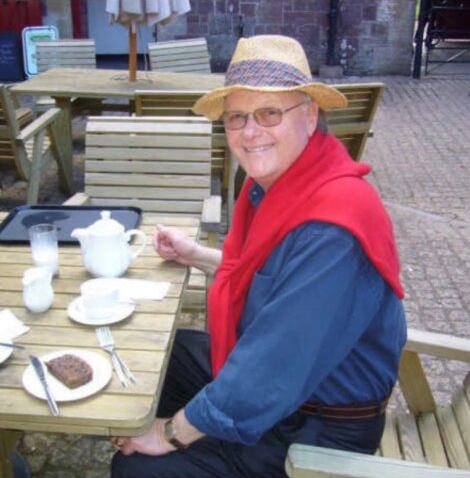
It is with great sadness that I have to inform you that Brian Lofts passed away peacefully on 28th February 2023 . Brian was aged 79 years.
Brian Lofts was born 3rd April 1943 and was Head Boy at Holloway School. He wrote, directed and produced the award winning silent film ‘The Prefects’, which was last shown at our AGM via Zoom. An account was published in 2020, in our quarterly newsletter in three instalments. Mary Embleton attended last year’s OCC’s Annual Lunch and presented items of memorabilia that her late husband Howard had treasured including the clapper board used in making of ‘The Prefects’. Brain will be sadly missed by all who knew him.
Brian’s eldest daughter, Korenne Lofts (Denison), said “Dad had lived an inspiring, generous and full life. Even though he knew that he had cancer for over two years, his determination and sunny optimism kept him a joy to be around as ever. Dad loved being part of ‘Old Camdenians’ through the years. I have seen that precious film so many times and so have Brian’s grandchildren- we are all so proud of him and thankful for the huge caring, loving part he played in all our lives. Dad was one of life’s Givers and Encouragers. He loved his summertime cricket and also his opera particularly Puccini and of course his long time love Venice since his first trip when he was 15 years old with his school! ”
Ray Rowe
We were surprised to learn about the passing of Brian when reading the latest Old Camdenian Newsletter. Never the less we wanted to offer up some words however belated they may be.
Our memories are different and that is because Bev went to school with Pat at The Camden School for Girls, and I went to school with Brian at Holloway. I think we were in form 5U1 with me leaving after O levels but Brian going into the sixth form.
The sixties were a time of change with careers taking people to different places. Lots of us no longer walked the streets of Tufnell Park or Kentish town and so the earlier connection was lost.
But there are small actions that stick in the memory and perhaps reflect the bigger person that lies beneath. I have two.
First it was a Brian that would join us in the school playground at week -ends where a bat, tennis ball and a chalk drawn wicket set us up for hours of cricket. Brian was the friendly player who brought to the wicket a subtle blend of spin bowling.
The second and more meaningful recollection was of Brian carrying my books from one lesson to another. I had broken my wrist at a school soccer match and was left with one arm in a sling. Brian stepped forward and kindly offered to take my books as we moved from one classroom to another.
One can determine the nature of a person through such minor events and the fact that I repeat them now gives essence to a person that we knew and remembered from the 1950`s.
Alan and Bev Shearn
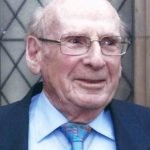
It is with deep sadness that we have to inform you of the loss of Eric who died 6th November 2020, aged 98 years.
I place here The Times‘ obituary to Eric; dated Saturday November 21 2020:-
Last of the ‘secret listeners’ who eavesdropped on captured Nazi generals in English country houses
Mark’s work led to the identification and destruction of most of the launch sites for V2 ballistic rockets Locked up in a camp on the Isle of Man to hold enemy aliens, Eric Mark, a German-born Jew and a refugee from Nazi tyranny, was eager to contribute to the war against his homeland. After two years an opportunity materialised.
British intelligence routinely interrogated enemy prisoners of war for tactical and technical information, and when the first German general was captured in 1942 a seam of strategic information was opened. Intelligence officers knew that a general, despite the humiliation of capture, would be too proud to demean himself by aiding his country’s enemy, but if caught off-guard in a private moment he might carelessly reveal a crucial secret.
More generals were captured and elaborate arrangements for their accommodation began. The estate of Trent Park in north London was requisitioned and each room bugged with microphones that were linked to listening points in the cellar. Trees and bushes in the grounds were also bugged. The idea was to create “special gilded quarters” for the “guests” to put them at ease and encourage loose talk. A Savile Row tailor even visited to make uniforms for them. Similar provisions were made at Latimer House and Wilton Park, both in Buckinghamshire, for U-boat commanders and Luftwaffe aircrew. Meanwhile, teams of German speakers were assembled.
After demobilisation, Mark obtained an economics degree from the London School of Economics and began working for Shell International Mark had enlisted in the non-combative Pioneer Corps and become a lance corporal. Called to the company office, he was informed he was now a sergeant in the Intelligence Corps and transferred to the Combined Services Detailed Interrogation Centre, where he was joined by other previously detained enemy aliens. Assigned to Trent Park, he became part of a team of secret listeners monitoring the German generals’ conversation in two daily shifts in the so-called M (for miked) Rooms: one shift from 8am to 4pm and the second from 4pm until the generals fell asleep.
“Listening to them talk was one of the most difficult times I ever had, but I could not show any emotion,” recalled Mark, who would sit in the cellar recording conversations on to a disc, which was then taken away for translation. “Most of them liked to boast about how many Jews they had killed, saying things like ‘I knocked off about 1,500’, which was tough for me to take, being Jewish.” Occasionally he and the other listeners would walk around the grounds and speak to the generals “who had no idea what we were doing”.
It quickly became clear that the generals fell into two camps: those who philosophically accepted the inevitable defeat of Nazi Germany, especially after the reverses at El Alamein in October 1942 and the surrender of their 6th Army at Stalingrad in February 1943, and those who had faith in the rumoured Vergeltungswaffen [retaliation weapons] that would change the whole course of the war. Discussions about the latter led to the secret listeners’ most significant breakthrough. Generals Wilhelm Ritter von Thoma and Ludwig Crüwell, both taken prisoner in the Western Desert campaign in 1942, were overheard discussing a German secret rocket programme. This was swiftly linked to a conversation at one of the other listening sites between two officers about concrete ramps they had seen in the Peenemünde area close to the Baltic coast. Air intelligence pounced on this information to help to identify the purpose of the site, believed to be a factory, in a cleared part of forest adjacent to the ramps. Here was the rocket factory and the launch pads ready for the missiles.
The night of August 17-18, 1943, marked the first of a series of RAF Bomber Command attacks on the Peenemünde factory and facilities. Mark and his fellow listeners at Trent Park had unlocked the secret of the Vergeltungswaffen, the V1 “flying bombs” that were to be launched on to southeast England the following year. Their discovery also led to the identification and destruction of most of the launch sites for V2 ballistic rockets. “As soon as I heard something interesting I put the needle down on the record . . . My job was to pass it on quickly for others to analyse,” Mark said.
Eric Meyer Mark was born in 1922 in Magdeburg, the son of Otto Mark, an importer of shop fittings, and his wife, Erna. He attended the local “Gymnasium” until his parents sent him to England, aged 12, to escape Nazi persecution. He attended Regent’s Park and Holloway schools and was planning to go to university when he was arrested as an enemy alien in 1940. His parents were sent to Treblinka concentration camp and did not survive.
In 1947 he met Miriam Majerfeld, a Polish refugee, at a party in London to mark the Jewish festival of Purim. They were married in 1951 and had three children: Anne is a Blue Badge tourist guide, David manages a photography gallery, and Sandra is a genealogist.
After demobilisation, Mark obtained an economics degree from the London School of Economics and began working for Shell International. From 1973 to 1987 he was head of the European Commission’s directorate of transport.
In 2012 he became the poster boy for Helen Fry’s book The M Room, later republished as The Walls Have Ears (2019), and a television documentary on the secret listeners. At the launch of Fry’s book, Mark received a standing ovation after a short speech in which he apologised that he was a little deaf — “ironically for a listener”.
Eric Mark, listener at the wartime CSDIC, was born on July 18, 1922. He died on November 6, 2020, aged 98
Dr Raymond Rowe

Although was not an Old Camdenian, his contribution to the club, being an honorary member, was considerable in many ways. He began playing in the lower elevens of the football club during the 1970s and what he may have lacked in finesse he more than made up for in enthusiasm and encouragement to his team mates. The high point of his playing career probably came in the 1980-1 season, when he captained and inspired the 7th XI into winning Division Four North of the LOBL – their only ever trophy!
With his natural bonhomie, Tony was completely in his element with all the post match banter and backchat in the clubhouse at Burtonhole Lane. It was there also, where he could be found offering good quality sports clothing and equipment (via his business contacts), at a significant reduction, for the benefit of club members. There were many takers, or in his words ‘punters’.
Subsequently and after persuasion from Ron Nutkins, Tony took up refereeing. He rose rapidly up the ladder and achieved the distinction of running the line at a Wembley Cup Final – an honour of which he was rightly proud.
He was in short, a great supporter of the Club, not least as a very generous contributor to the 50+ Club. More recently Tony was a regular attendee of our luncheons, where his ever cheerful presence and bear ‘hug greeting’ will be greatly missed. Our thoughts are very give his family at this difficult time.
Compiled by Alan Meyer with the help of Peter Sumpter
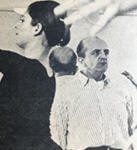
He also appeared in various films including ‘Knights of the Round Table’ 1953, ‘The Red Shoes’ 1948, ‘Stage Fright’ 1950 & ‘Invitation to the Dance’ 1956 and danced at historic events such as the coronation of Prince Rainier of Monaco. He moved to the US in 1953 and became a teacher at a ballet studio in Minneapolis 1953-1954, before Ruth Pryor brought him to Cleveland in 1954 where he taught at Ballet Russe.
He founded the Ballet Guild of Cleveland, the city’s first nonprofit touring semiprofessional ballet group in 1958 and taught numerous Cleveland-area teenagers who leaped into professional dance careers. He opened his own studio the Cleveland Ballet Center 1958 and Cleveland Institute of Dance 1962, where he taught young people the basics of ballet and preached the doctrine of discipline. ‘When a dancer performs, it doesn’t matter if his feet hurt or if his mother just died. His duty to the audience comes first. Nothing outside can matter’. Although he gained a reputation as a hard taskmaster, Alex showed compassion for promising dancers who couldn’t afford to pay for his classes. “I am grateful to Mr. Martin for the full scholarship he offered me in exchange for cleaning the sinks and toilets in the dressing rooms,” said Catherine Turocy, artistic director and co-founder of the New York Baroque Dance Company. “As this was also one of my Saturday chores at home, it seemed like a small price to pay.
Coming from a family of eight children, I know we could not have afforded lessons otherwise.” Some of his students received scholarships from the Ford Foundation and the ballet program continued due to the National Endowment for the Arts and other grants. The company did something in the region of 300 performances, and many productions were put on in poor neighborhoods, especially for the children. By 1974, Alex gave up the struggle of trying to keep the Ballet Guild financially on its feet. This led a core group of Ballet Guild board members to take steps to establish a professional dance company, the Cleveland Ballet.
Alex was a prominent figure in the development of dance in Cleveland, many of his students became established dancers, and Alex’s Ballet Guild of Cleveland became the precursor to the Cleveland Ballet. In his later years, Alex wrote reviews for dance publications in England. Alex died in January 2006 at University Hospital Hanna House, Cleveland, Ohio aged 84 years. Alex left no immediate surviving relatives. RH
Harold “Twink” Martin 1932-37
The funeral of “Twink” will take place on Wednesday December 2 at 2p.m. Eltham Crematorium, North Chapel, Crown Woods Way, Eltham, London SE9 2AZ
Family Flowers only, donations to Diabetes UK c/o Co-Op Funeral Services, 7 Station Parade, Station Road, Sidcup DA15 7DB
Nearest Station Falconwood (Charing Cross)
HAROLD MARTIN (“Twink”) 1920-2009
Harold was affectionately known to his classmates and all Old Camdenians as “Twink” – a named he derived as a young pupil because of his “starlike” qualities. Twink was a bustling, busy person with a quick and active brain. He had an in depth knowledge of The Club, being one of the few remaining Old Boys who spanned the pre and post war years. He was Secretary to the now defunct “Camdenians’ Society” and was for a time Secretary to the main club.
In 1994 he was made Honorary Life Vice President of the Old Camdenians Club. Shortly after the war, when notices to members were sent out by hand addressed envelopes at committee meetings, he would stop at many of the names and tell an anecdote about the person ( not possible now with computers). He was jointly instrumental in drawing up the club constitution, which remains to this day.
He was a keen badminton player in the days when the old hall doubled up as a badminton court. Prior to joining the Old Boys Dramatic Society he had joined several touring theatrical companies, performing a number of tasks and roles both back and front of stage. He was also heavily involved in the reforming of the Tavistock Players Company and the renovation of Canonbury Towers where his skills learned as a maintenance fitter during his wartime RAF days were put to good use. Whilst he had several different employers, he spent most of his working life at Gerald Eve, a large company of Chartered Surveyors. In retirement, Twink became heavily involved with the local residents association, the local Civic Society, the Docklands Forum and the local Council on environmental issues and planning applications.
We send our sympathy to his wife Beryl. They had been married 46 years.
Richard Brown
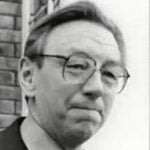 For more than 40 years, William Edward John McCarthy, tracked the progress of Britain’s industrial relations from his base at Nuffield College, Oxford. Bill charted the growth of shop-steward power in the 1960s, was enmeshed in the struggles of Labour and Conservative governments to regulate the unions in the 1970s and 80s, and, after the Thatcherite revolution swept away many of the assumptions of his working life, tussled with the TUC and Labour to find an industrial relations consensus. His understanding of the intricacies of collective bargaining guaranteed him a role as an arbitrator of knotty disputes, from train drivers to teachers, and later as a Labour spokesman on employment in the Lords.
For more than 40 years, William Edward John McCarthy, tracked the progress of Britain’s industrial relations from his base at Nuffield College, Oxford. Bill charted the growth of shop-steward power in the 1960s, was enmeshed in the struggles of Labour and Conservative governments to regulate the unions in the 1970s and 80s, and, after the Thatcherite revolution swept away many of the assumptions of his working life, tussled with the TUC and Labour to find an industrial relations consensus. His understanding of the intricacies of collective bargaining guaranteed him a role as an arbitrator of knotty disputes, from train drivers to teachers, and later as a Labour spokesman on employment in the Lords.
Bill was born on 30 July 1925, brought up in Islington, north London, attended Holloway County school. He left school to become an assistant in a gentleman’s outfitter. The shopworkers’ union Usdaw recognised a precocious intelligence and secured him a scholarship to Ruskin College, Oxford, in 1953. Glittering progress followed, though his self-confidence did not always endear him to others. After a distinction in his diploma, there was a first at Merton College in philosophy, politics and economics before, in 1958, he embarked on a DPhil at Nuffield, becoming a research fellow the following year. He remained at Nuffield as faculty fellow from 1969 and emeritus fellow from 1992.
At Ruskin he met Margaret Godfrey, the daughter of an Oxford midwife. They married in 1957. It was a close partnership; she encouraged him when his self-belief faltered and they battled side by side in the Oxford Labour party, where both held office. From Ruskin, too, came a lifelong friendship with Ruth and Derek Gladwin, later a major figure in the GMB union and chairman for years of the Labour party’s conference arrangements committee.
Bill’s D. Phil was on the closed shop: it was a timely look at the growing influence of shop-steward power amid rising political worries about the breakdown of centralised union control and the growth of “unofficial” locally endorsed action, labeled in newspaper headlines as “wildcat strikes”. When this concern was translated into Lord Donovan’s Royal Commission on Trade Unions and Employers’ Associations by Harold Wilson’s government in 1965, Bill was an obvious candidate for research director. His colleagues remember his energy and enthusiasm and the quality of the research papers, while the report’s famously permissive conclusions, against restrictive legislation, in favour of union involvement in broader business questions, chimed with his convictions.
These broadly followed the “Oxford School”, a group around Allan Flanders and Hugh Clegg, who became Bill’s supervisor and mentor. Flanders had emphasised the importance of organisations involving trade unions, insisting that it was not so much outcomes as the extent of involvement which mattered. The idea of a trade-off between giving unions a say on broader national issues and demanding greater responsibility became a critical theme for Bill.
As prices and incomes policy continued to preoccupy the Labour government, Bill was summoned to the economic research department of the Department of Employment and Productivity set up by Barbara Castle in 1968. His appetite for the political inside track took him deep into the government’s discussions about statutory intervention in collective bargaining. Although this had been rejected by Donovan, ministers were now increasingly drawn to it as a response to growing industrial action.
Bill was at the Sunningdale conference in 1968 when Castle unveiled her blueprint for what would become the In Place of Strife policy – an attempt to regulate union behaviour by sanctions including cooling-off periods, in exchange for extending workers’ rights. He noted: “She came down, this tiny little person and sat in this great chair, and it was marvellous; it was how we were going to thread our way through all these difficulties and she asked me to write it.”
But the consequences were bitter. The draft, Partners in Progress, was attacked in cabinet and by the TUC after it was leaked. Redrafted as In Place of Strife, it came up against the “terrible twins”, the new trade union leadership of Jack Jones and Hugh Scanlon, who joined with Jim Callaghan, then home secretary, and party doubters to defeat the idea of legislation. Instead an agreement was cobbled together, with the commitment of the TUC to take effective action on unconstitutional strikes.
As an industrial relations adviser and arbitrator, Bill had to work hard to regain the confidence of the big union battalions. Ironically, his own views were permissive: “We have no certainties to put in place … what we offer is merely a greater appreciation of the limits and constraints [on change in trade unions],” he wrote in 1981, shortly before Margaret Thatcher shifted the landscape irrevocably.
His academic colleagues saw him as a great empiricist, without a strong theoretical framework, fascinated by minutiae. “Give him an obscure rule book,” said one friend, “and Bill is never happier.” For 30 years he produced a book almost every year. The role of shop stewards or employer’s associations, wage inflation, New Labour at work, employment legislation, were all analysed. He was recognised as an outstanding teacher, but preferred practice to theory, and was regularly called on to help with union mergers and for arbitrations and inquiries. But he would resist being named as the union choice, guarding his independence, in spite of his transparent politics.
He and Margaret were renowned for their work as canvassers, and Bill’s chairmanship of the Oxford Labour party in the 1960s and 70s was marked by a mastery of procedure and the way he moderated between vociferous proponents of opposing beliefs from CND to proto-Social Democrats. His own views were centrist; a close friend of Tony and Susan Crosland, he was most comfortable with moderate union leaders such as Gladwin, David Basnett and Sid Weighell. His wider political career was subject to Labour’s factionalism, and ended in some disappointment.
He was created a life peer on 19 January 1975 by Wilson as Baron McCarthy of Headington in the City of Oxford to buttress its industrial relations expertise. He was cold-shouldered by Callaghan, with whom he had clashed years before over immigration policy and union reform. A man of strong likes and dislikes, and a sharp tongue, he would tell friends, “never trust a word that Jim says.”
After the Thatcherite assault on union rights, he and Bill Wedderburn, his legal academic counterpart, became a powerful double act as TUC advisers and in the Lords. But the arrival there of heavyweight union leaders such as David Basnett and Muriel Turner diluted their influence. Unimpressed when Tony Blair became the party’s employment spokesman, he was still hurt when Blair declined to give him a frontbench post when he became prime minister. After the Iraq war, he would describe Blair as worse than Ramsay MacDonald.
Shaped by the 1960s and 70s Labour party, he found some difficulty in adapting to new currents in Labour and TUC thinking. An opponent of entry into the Common Market, he remained sceptical, even scornful, of European trade union activity which increasingly absorbed the TUC. He remained in his element, and in demand, dealing with complex arbitration issues, although the results were not always clearcut. His chairmanship of the Railway Staff National Tribunal from 1973 to 1986 coincided with major industrial unrest but never seemed to impinge. A colleague described him as “a good sticky-wicket batsman. He could always come up with a good answer. If it didn’t satisfy, at least it kept them quiet.”
Typically, his experience was translated into academic studies of the arbitration and conciliation process.
Outside industrial relations and politics, his keenest interest was theatre and its history. Always liable to break into a quotation from Shakespeare, he and Margaret were passionate supporters of the Royal Shakespeare Company.
Bill died on Monday 18th November 2012 aged 87 years and is survived by his wife, Margaret.
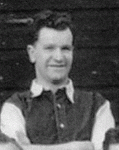
In 1939, he was evacuated with the school to Towcester for four years and was lucky enough to stay with a nice family with two children of their own and two other evacuees. He recalled that he must have been one of the few students to have passed their ‘School Certificate’ while sitting the exams in the boy’s toilets – the toilet block was underground and in the war considered to be a safer place.
On the school’s return to London in 1943, Dave played a great part in establishing Holloway as a force to be reckoned with in school soccer. During the next 4 years the 1st XI were not only undefeated but had an overall goal average of 10-1! Players of the calibre of George Robb, Stan Heritage, Mick Grassman, Alec Godfrey and Ken Parsons all contributed to this successful period.
In 1946, four Holloway players – Dave, Mick Grassman, Alec Godfrey and Ken Parsons were picked to tour Norway as members of a North London Grammar Schools representative team with Ted Drake (Arsenal & England fame) as the manager. There were, apparently, many interesting discussions between Dave and ted drake during the tour! Subsequently, Dave, Alex and Mick were invited to sign amateur forms for the Arsenal but National Service and University reduced such signings to distant memory. Dave was 17 years old when his father died and he left school to become the ‘breadwinner’ for his mother and himself. His first job was in an office prior to two years national Service. During this period he obtained a diploma in electronics. He then decided to pursue a career in teaching and applied for a place in the College of St. mark and St. John in Chelsea. He needed a reference from a priest – a little difficult – particularly as Dave had never been to a church in his life other than singing in the church choir when he was evacuated. An Army Chaplain came to the rescue with a reference saying ‘I don’t actually recall who he is, but he does have a good army record’ – on this he was accepted.
He completed his B Sc in physics, mathematics and chemistry followed by teacher training. History, the arts and politics were also of special interest to him. He studied and read the Old Testament as part of his course and came top in R.E. – still without ever going to church!
Just before taking his first teaching post at Alleyn School, he took a temporary job as a hospital porter at UCH. It was there he met his future wife, Jean, who was a nurse and they married in March 1956. By a great co-incidence, some members of the OC’s were passing through a south coast town on the first day of their honeymoon and they gave a suitable rousing cheer when they saw Dave proudly walking with his new bride.
After a spell at Slough technical Grammar, Dave and Jean, decided in 1961 to move their then two small children to start a new life in New Zealand: a move they never regretted. In the 60’s Dave continued his sporting activities, always played with a big heart and gave 100% and would often come off the field exhausted. He claimed all his children were conceived on a Saturday night as he’d arrived home from football tired and completely unable to defend himself!
Dave and Jean have lived in both North and South Island during the course of Dave’s teaching career and finally made their home in Auckland. One of his roles was as physics lecturer at Auckland Teachers College. he was a superb lecturer – not interested in the theoretical or politically correct way of doing things, but as a master teacher himself he wanted to actually teach the teachers ‘how to teach’. In education he was a strong disciplinarian, but did not approve of corporal punishment – perhaps memories of Doc Atkinson played their part.
He has many interests – CND, Greenpeace, racial equality, calligraphy, football and tennis club committees. One special lifelong interest was the collection of cartoons; his garage was full of them, all categorised under education, law and order, politics etc. He also loved drawing caricatures, particularly people at meetings! he was a self-confessed hoarder and nutcase! He loved all types of music, was a good debater and had a wealth of knowledge. He was the person the family always turned to for advice.
On both sides of the world Dave has left his mark. He will be remembered as a fun-loving person with a wonderful sense of humour, that remained right to the end. When he was first diagnosed with cancer nearly three years before he died, he telephoned one of his sons and simply said ‘Alex I think I’ll take up smoking!’
The word that comes to most people’s mind when thinking of Dave is enthusiasm, his enthusiasm did so much for the school and the OC’s and for all the organisations he was involved with in New Zealand. We all feel the better for having known Dave and give thanks for his life.
Reg Taylor
After gaining 8 General and 4 Higher School Certificate passes at holloway, John graduated from the then Northern Polytechnic with an Honours Degree in Physics. In 1952 he joined Edison Swan Co. at Brimsdown (later Thorn EMI) where he remained until 1984 becoming Senior Engineer working on the Blue Fox radar system for the RAF Sea Harrier.
He subsequently worked for the DTI in the Patent Office and then the Insolvency Department. Although he never attended the Dinner, John kept up to date with School and Old Camdenian matters and was particularly interested in the reminiscences of those who, like himself, were evacuated to Towcester during WW2 – an experience which made a great impression on him. He always spoke highly of the teachers of Holloway and held Doc Atkinson, ‘Bunny’ Griffiths and ‘Bump’ Brown in particularly high esteem. He passed away in hospital in November 2003 after an illness that lasted several months
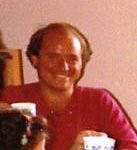
His forthright, yet essentially friendly, nature will be greatly missed by all who knew him. Many Old Camdenians were among the large gathering at St. Pancras Burial chapel on 26th September 2011 and afterwards at Wingate Finchley F.C. Our deepest sympathies go to Denise, Stewart, Robert and the family on their sad loss.
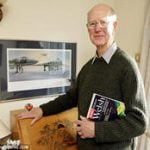
“Alun” as he was always known, was born of Welsh Parents and successfully passed to go to Holloway School and eventually became both House and School Captain. He was a very uncompromising “Full Back” as I remember but I believe he would have preferred Rugby perhaps because of his Welsh heritage.
In those days the Vlth. Form of Holloway together with William Ellis, Parliament Hill Girls and Camden Girls School used to organise monthly Dance/ Socials. It was at one of these that Alun met Yvonne his future wife.
Although he qualified for University, he was selected for Pilot’s and Officers training at Cranwell, the esteemed R.A.F. College. This proved significant because after he was commissioned he decided to make the R.A.F. his career and was selected to be one of the first pilots of the “V” bombers eventually being promoted to high rank in Bomber Command. The O.C.Club has in its archives a picture of him being greeted in the U.S.A, having made the first “goodwill” flight to the States.
Alun was not only an excellent operational Officer but later in his career, he proved to be also an extremely able at administration and diplomacy which led to many very prestigious postings such as Hong Kong, Singapore, Cyprus, USA and Brussels Belgium and his extremely high rank of Air Commodore.
After retirement from the RAF he studied and obtained a Degree at Bath University and then subsequently was a Lecturer at the same University.
He was also appointed, by the Lord Chancellor, Inspector for road and footpath schemes, and chaired inquiries of all sizes such as the Snowden Railway and Carmarthen and Merthyr by-passes.
He was always a great supporter of the Camdenians and will be sorely missed at the Annual Dinner and I for one will remember him in the traditional 9pm Toast “Absent Friends”.
To quote Alf Mortimer on learning of his demise wrote
He was always so cheerful and optimistic and the fact that he had such a successful career made me justly proud we shared the Vlth. Form together. He was a real role model
He was reported in the national press as an Englishman who, after a “stroke” woke up speaking Welsh. The truth was entirely the other way round inasmuch he was a Welshman, bilingual who woke up speaking no English. He thought it a hilarious episode and enjoyed being interviewed about his Welsh roots.
He, Yvonne his Wife and two daughters had 24 different Homes during his service but to quote his daughter Shan Morgan, to whom I owe sincere thanks for providing me much of the content of this Obiturary, they had a warm and happy home wherever he was stationed and
“Gwag yw’r aelwyd hebddot ti”
Our Home is empty without you
George Ives
Alun died in 2013 ahd his funeral took place on Friday 1st February 2013 at 12-30pm at St. Nicholas Church, Bathampton, Nr. Bath.
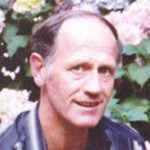
For over twenty years, Alf was a stalwart of the Football Club, playing for much of that time at wing half in the higher elevens. His energetic, all action style of play inspired team mates to give of their best, whilst his competitive spirit and fierce tackling made him a formidable opponent. This was, however, coupled with a strong sense of fair play and sportsmanship which won him great respect both on and off the field.
Alf’s sustained level of fitness throughout his active life was remarkable. In later years, he appeared regularly for the O.C. Veterans XI, and ended his playing career with Crouch End Vampires at well over the age of sixty. He was, in addition, a talented tennis player, still competing at a high level in the Seniors game well into his seventies. Indeed he was for a time a member of the England Senior Squad.
Alf was a dedicated Old Camdenian, and was heavily involved in the design and construction of the clubhouse at Burtonhole Lane, as well as serving the club in a variety of other capacities. Who can forget those trips to away games in the back of his furniture van! He was always good company with a fund of amusing anecdotes and seldom failed to attend the annual Dinner/Lunch at the School, which he greatly enjoyed. His presence on those occasions and elsewhere will be sorely missed by all those who knew him.
Our sincere condolences go to Mary and the family at this sad time.
Alan Meyer
A great Sportsman, hard but fair, a stickler for playing by the rules, an “impish and “wicked” sense of humour are some of the attributes that the many O.C.’s gathered at Alf’s Funeral expressed, Many reminisces were related about Alf and how he would transport the Teams to matches in the back of his furniture Van. All of these sentiments and more were conveyed in the tributes extended to him during the Service.
Alf was a great personal friend and I have cause to thank him for the many kindnesses he extended to the large Charity, of which I was the Director General inasmuch as he supplied much of the fittings and specialist equipment to the new Hospital Section we built and equipped as well as providing much of the furnishing of the Bungalows at cost price.
The Club has lost a great stalwart, so many of us have lost a Great Pal and I like many have lost a Great Friend. All of us will miss him greatly and I for one will remember him when we take the Toast at the O.C. Lunch to Absent Friends.
George Ives
Alf died in 2018 and his funeral took place at 3pm Monday 5th February 2018 at Woollensbrook Crematorium,Hertford Rd,Hoddesdon, Herts EN11 9BN
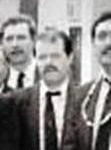
He was an enthusiastic sportsman and was selected to represent Islington Schools for a match against Possil Park Y.M.C.A., Glasgow at the Arsenal prior to a league match against Leicester City in October 1966, but this match was cancelled due to morning rain. He represented Newcastle University as a medium fast bowler and played for the Old Camdenians Cricket Club during the summer breaks. He continued for many years as a useful swing bowler for both the first and second elevens and was also considered handy with the bat.
Always quick to see another’s empty glass he was an intelligent and humorous friend to have around, whether in a group or just to meet for a catch up. He was a fervent West Ham supporter, travelling on push bike from Holloway Road to the Boleyn Ground from his early teens until adult employment afforded him the luxury of a tube ticket.
He had a huge collection of books and music albums which represented what teachers might call ‘a wide catholic choice’. He attended concerts by artists and groups unheard of by the rest of us but many a boring motorway journey to one of England’s football grounds was enlivened by his collection of ‘Round the Horne’ tapes.
He worked at Islington Council until in his later years he suffered from MS and passed away on November 25th 2010.
John Barber
